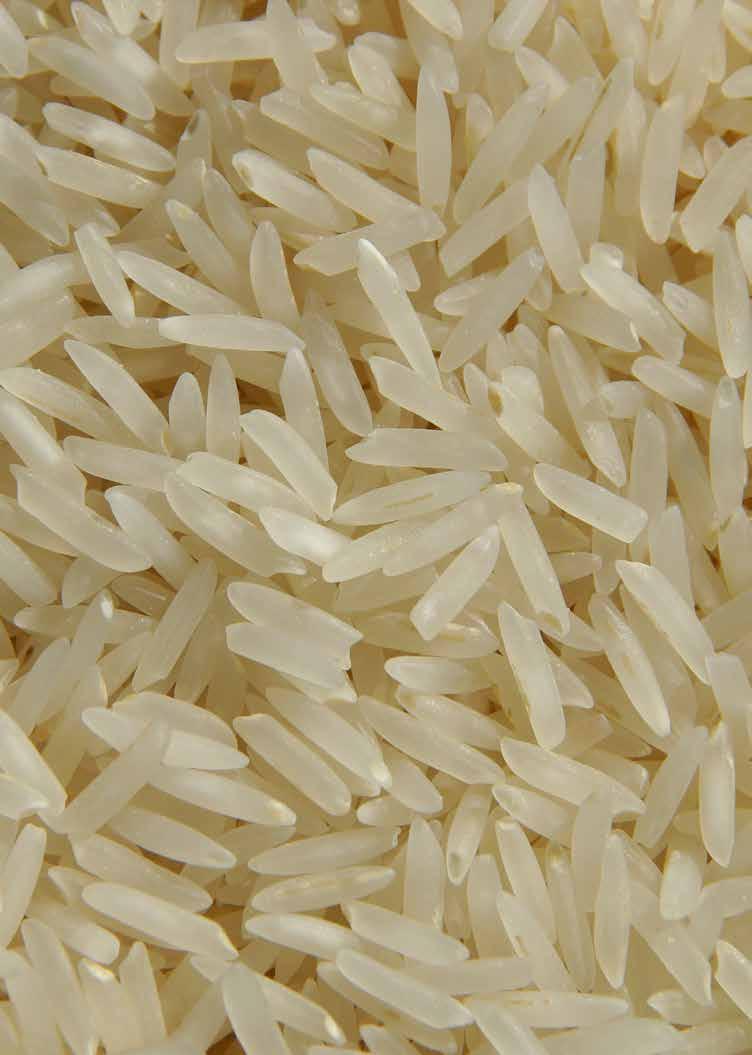
9 minute read
WUYUAN
WU YUAN
Vistas and Villages
Advertisement
By Sophie Steiner
With Golden Week here and borders still mostly closed off for travel, expats and Chinese nationals alike are looking for a way out of the city and off the beaten path yet still within the confines of China. While more common options, like Moganshan (for those in Shanghai), Guilin or Yunnan are top of mind, there are alternatives that are even easier to reach and explore that arguably offer a more authentic side of China.
Wuyuan, in Jiangxi province, is located just 3-4 hours from Shanghai by high-speed train and boasts an impressive array of options for travelers seeking any combination of relaxation, nature, culture, art and food.
After heavy investment from the government and the construction of a high-speed railway station in Wuyuan, the lesser-known province of Jiangxi has garnered a welldeserved boost in tourism over the last five years, yet it remains relatively untouched and retains its rustic, authentic countryside charm. March and April see the largest influx of tourists for the sea of yellow rapeseed flowers that cover the rolling hills and small villages. Still, Wuyuan really is a year-round destination, with outdoor activities and distinct natural benefits found during all seasons.
Here are our suggestions for where to spend your time, what to eat and where to stay for an ideal Wuyuan vacation.
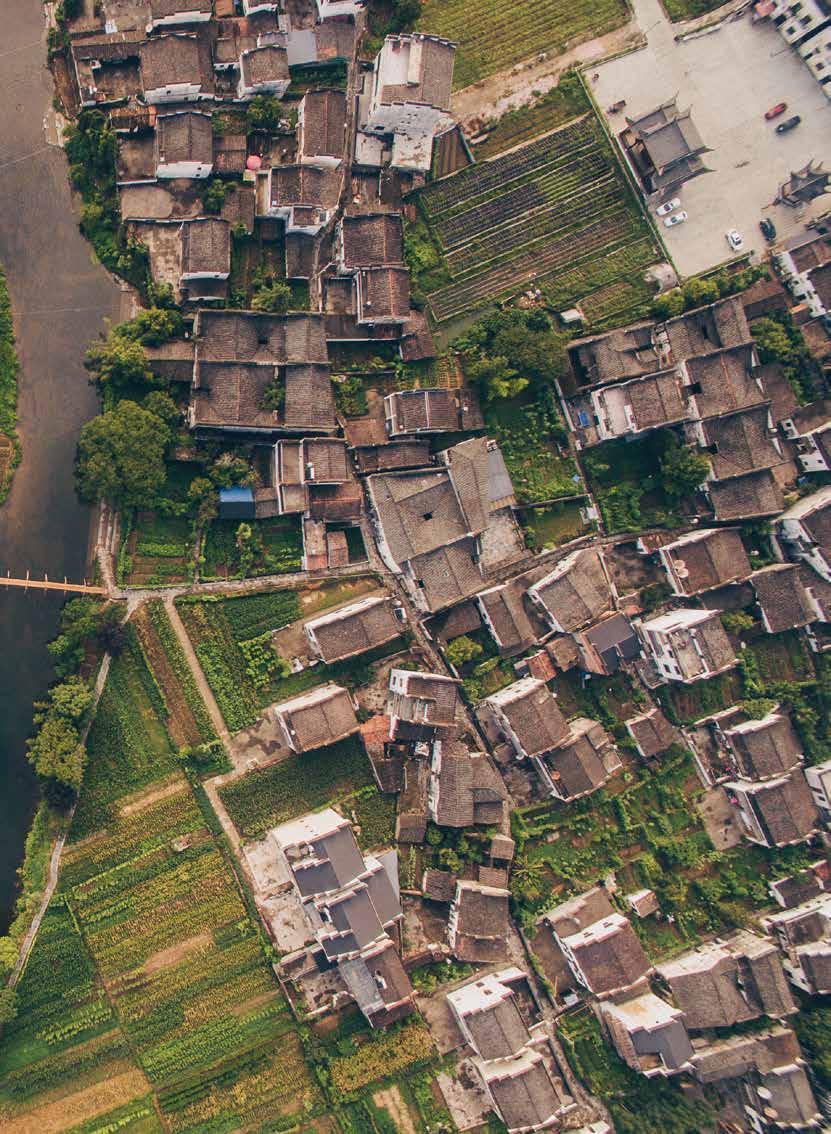
Village Hopping
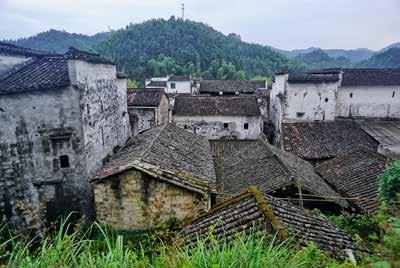
Wuyuan has no shortage of small villages, each with their own unique personality and point of interest. Visiting a handful in a day is quite popular, and will usually set you back around RMB300 for The 4-kilometer loop brings trekkers to 15 unique waterfalls in Xitou. If it’s nature sounds you seek rather than squawking photo gawkers, push past the first few falls for the ones near the end of the trail, where you can swim and take in the surroundings in peace. Grab a bite taurant where the menu is a refrigerator, and fish are caught to order from the pond that the restaurant is built around. Featuring loads of fresh produce and tofu options, this restaurant is quite vegetarian friendly.
Follow up a visit to the falls by submerging yourself into the slow-paced country life at Jiangangling and neighboring Huangcun for an afternoon meander through back alleys a full-day driver. There are a few popular routes, like the East Line that takes you from Small Likeng, a sleepy village with great sunset views and late-night local foodie spots that spill out onto the main road, to Wangkou, famous for its 1,000-plus-year-old ‘Moon Well’ that’s been used for drinking, washing and medicinal properties for longer than most civilizations have even been around. Next, hop to Huangling with its expansive cable car ride and then over to Xiaoqi, a village divided in two where the upper section is more geared towards tourism and the lower area is secluded and peaceful. The North Line also has a few branch options that take you across other parts of the region. Along this route, you can ride a boat through a cave forest park in Lingya, make traditional paper umbrellas at its birthplace in Jialu, admire a Game of Thrones-esque moat sur-
Xitou Waterfalls
at Yejia Dayuan (叶家大院), a country-style res-
villages. These authentic villages are located just 5-10 minutes’ drive away. They are ideal rounding Jujing or bask in Changxi’s exquisite autumn foliage.
to watch people going about their daily lives, fishing, washing clothes and catching the latest village gossip.
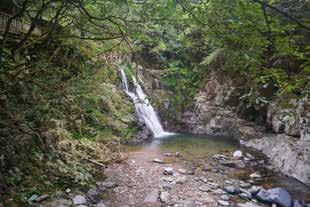
Jingdezhen

Every Saturday morning in Jingdezhen, a creative market is held outside the sculpture factory. Young artists display their individually designed and created wares of anything from cups, mugs and plates to scarves, jewelry and even artisan liquor. Known as the world’s porcelain capital, ceramics are found everywhere, even molded into patterns on the sidewalk. Check out the Sculpture Factory Main Street for some extra shopping, and swing by Southern Sloth, a new father and son-run craft brewery tucked down a narrow alley. Kai, the face of the brand, focuses on marketing and design, while his father, a Mao-era engineer, is in charge of production. Tao Xi Chuan district, an industrial factory area, has also been converted into an everyday art district, filled with displays, cafes and shops.
Wulongyuan
For the adventure seekers, Wuyuan offers white water rafting at Wulongyuan, albeit tame when compared to more rugged rafting in other parts of the world. With manicured slides and minimal physical activity, the 40-minute journey downriver is still thrilling nonetheless. Confident swimming ability is advised.
Jiangxi Lengfen
The cold bean starch noodles, a popular dish in Jingdezhen, feature unctuous, chewy noodles that soak up all of the flavor of the vinegar, soy and sesame oil dressing. Topped with cilantro, fresh cucumber, crunchy pickled radish, citrusy dried orange peel and insanely spicy chili sauce, the crazy combination of flavorful components is memorable in more ways than one. We found our favorite version at a small noname cafe nestled beside an art gallery in Jingdezhen’s Tao Xi Chuan district.
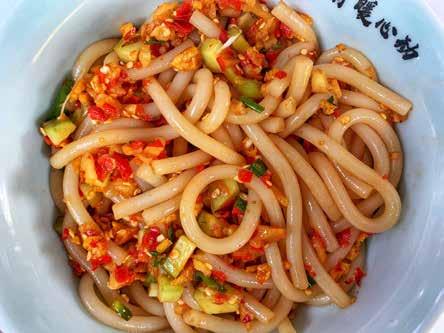
Zheyuan Moon Cakes

Zheyuan may seem like any of the other 50 plus Wuyuan villages, but along the main street sits the most famous moon cake baker and Chinese pastry maker in the entire area. Here, people come from the city directly to the shopkeeper’s humble store, adorned with a self-made pizza-oven look alike used for baking bing of all kinds around the clock. The buttery black sesame and tangerine peel-stuffed bing crumble like a sugar cookie, and thankfully are available year-round, while the more typically-shaped moon cakes filled with thick red bean paste or a mix of sweetened nuts and seeds put all other moon cakes to shame.
Lotus Leaf Wrapped Steamed Ribs with Sticky Rice
Jiangxi is known for its steamed yet flavor-packed dishes, and the pork ribs with sticky rice wrapped in a lotus leaf are a taste of pure comfort. Similar to the Cantonese lomaigai, this dish incorporates simple flavors, like ginger, soy sauce and Shaoxing wine mingled with the earthy flavor imparted by the lotus leaf wrapper and extra body from rice flour to create that perfect bite. Think fall-off-the-bone meat accompanied by chewy, fat-soaked, flavor-filled rice. We found our favorite version in Zhangcun, a small village right behind the larger town of Sikou. The restaurant and hotel combo, Jialu Nongzhuang, is popular among locals and tourists alike, and for good reason – their rustic food and wide range of specialty dishes are top-notch.
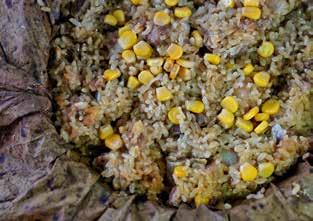
Sleeping Sound
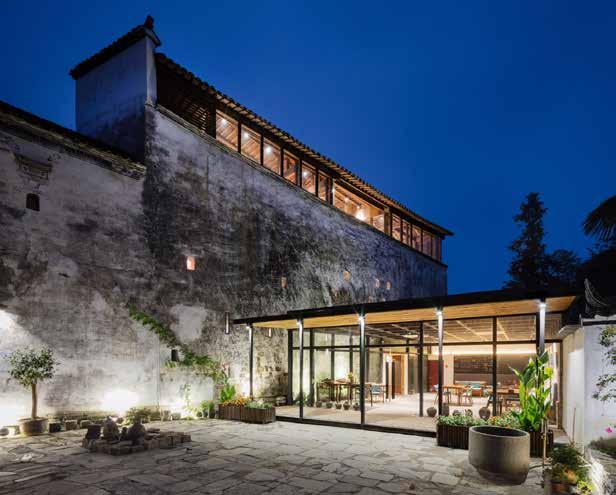
The Wuyuan Skywells
The Wuyuan Skywells is a family inn and passion project of England-native Edward Gawne, his Jiangxi-born wife, Selina Liao, their adorable daughter Victoria and soonto-join-the-family baby boy. This 300-year old refurbished mansion from the Qing Dynasty is the family’s antidote to the milehigh skyscrapers, ruthless overtime culture and relentless pace of life in modern China.
Ed quit corporate life just three months before his 30th birthday to pursue his passions after working in market research in Shanghai for years. While living in Nanchang, his wife’s hometown, he studied Chinese for a year and spent his weekends exploring the Jiangxi countryside, where old houses, farms, and forests are in no short supply. Selina, a passionate entrepreneur, was equally intrigued by her home province’s untapped village tourism, and together they decided to venture into this nearly untouched market.
After building a dream team of global architects, design agencies and carpenters, the project was underway in 2016 and came to fruition in 2017. By 2018, the unique balance between preservation and state-of-the-art design afforded them universal acclaim, being named the 2018 Red Dot Award Winner, 2018 LEAF Award Winner, 2018 Travel Hospitality Award Winner and many more.
The Skywells name comes from the signature architectural feature of Wuyuan houses, a wide-open ‘window’ in the structure’s roof that keeps both the heat and other unwanted people out, while still allowing fresh air and light to reach inside. Ed and Selina honor the home’s history by maintaining as much of the original structure as possible, while still making it a comfortable oasis for guests and themselves. (They got married and still live at Skywells today.)
Ed and Selina take pride in tailor-making itineraries to fit each individual’s wants, caring about everyone’s overall experience both in and out of the inn. Since they live at Skywells about 80-90% of the time, it’s not uncommon for them to enjoy a dinner with guests, pouring over maps, pulling up photos and sending WeChat pins of obscurely famous tofu makers and moon cake bakers located in villages off the beaten path. “If it’s on Dianping or Google, we generally won’t send our guests there. We prefer to find our own trails and unique trip highlights to make each person’s stay that much more memorable,” says Ed, while harvesting Jerusalem artichokes in the garden, preparing them to be pickled as a breakfast side dish.
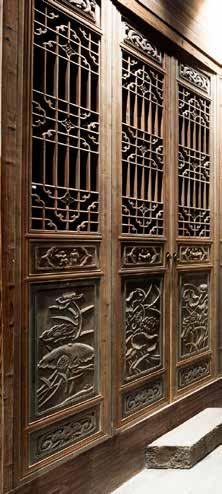
Ed and Selina have designed a set of hiking, biking and ofinterest village maps for their guests to use. From grueling 10-kilometer treks through forests, across tea fields and into tiny villages, to relaxing bike rides passing by farms and cornfields, they pride themselves on finding something special and appealing, no matter what their guests seek out of a vacation.
“A hotel is only as good as its guests,” is the motto Ed and Selina live by. Still, we are pretty sure that in this case, it rings especially true if you swap out the word ‘guests’ with ‘owners.’
Stay tuned for the family’s newest project, an English Country Manor surrounded by lush tea fields on one side and a picturesque calm lake on the other, located just 5 kilometers away from Skywells. This 30room venue is aimed at families, with two acres of garden, kayaks, a large library and Victorian-style fireplaces in each building. We look forward to seeing it open to the public around early Winter 2020.
> To book a room at Wuyuan Skywells, call +86 136 1194 6697 or email frontdesk@ wuyuanskywells.com
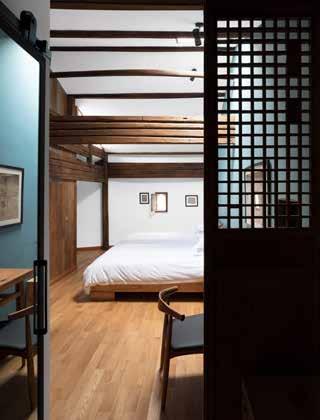

BUSINESS TECH &
